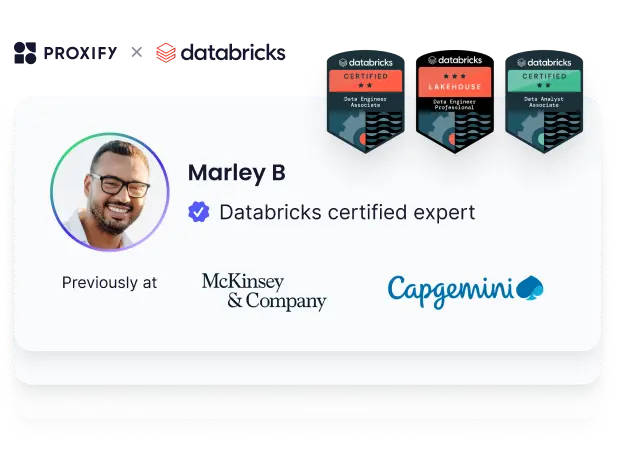NEW
Proxify is bringing transparency to tech team performance based on research conducted at Stanford. An industry first, built for engineering leaders.
Learn more
Databricks, renowned for its advanced analytics and big data processing prowess, is a dynamic platform empowering developers and data scientists alike.
Let's dive into the essentials of building a stellar team that can navigate and thrive in the fast-paced world of Databricks.
Understanding Databricks
Databricks offers access to many data sources and integration with Apache Spark.
Its flexibility and customization capabilities enable the creation of a spectrum of solutions, from streamlined utilities to enterprise-level innovations. With technologies like Delta Lake and MLflow, Databricks further refine efficiency, facilitating seamless data management and machine learning workflows.
Databricks excels in high-performance data processing and real-time analytics, leveraging Apache Spark's distributed computing capabilities. Its unified platform simplifies development across industries, making it an ideal choice for organizations seeking scalable solutions.
As trends like data lakes and AI convergence shape its trajectory, Databricks remains at the forefront of innovation in data management and analytics.
As Databricks continues to dominate the global big data and analytics market, emerging trends such as the integration of AI and machine learning, alongside a heightened focus on data security, are shaping its future landscape. With its dedication to innovation and adaptability, Databricks stands poised to lead the charge in revolutionizing data-driven solutions for years to come.
Industries and applications
Databricks finds applications across various industries, including finance, healthcare, retail, and telecommunications. Its versatility lies in its ability to handle diverse data sources, ranging from structured databases to unstructured data like text and images.
Various companies leverage Databricks for tasks such as predictive analytics, real-time data processing, and recommendation systems. Its cloud-native architecture makes it a smart choice for companies seeking scalable and cost-effective solutions for their big data challenges.
Must-have technical skills for Databricks Developers
Certain technical skills are non-negotiable when hiring Databricks Developers. These foundational abilities enable the developers to utilize the Databricks platform effectively and ensure they can seamlessly drive your data projects from conception to execution.
- Proficiency in Apache Spark: A strong understanding of Apache Spark is crucial as Databricks heavily relies on Spark for data processing and analysis.
- Spark SQL: Knowledge of Spark SQL is essential for querying and manipulating data within Databricks environments.
- Python or Scala Programming: Competency in either Python, R, or Scala is necessary for developing custom functions and implementing data pipelines.
- Data Engineering: Expertise in data engineering principles, including data modeling, ETL processes, and data warehousing concepts, is fundamental for designing efficient data pipelines.
- Cloud Platform: Familiarity with cloud platforms like AWS, Azure, or Google Cloud is essential for deploying and managing Databricks clusters.
Nice-to-have technical skills
While some skills are essential, others can enhance a Databricks developer's capability and adaptability, positioning your team at the forefront of innovation and efficiency. Some of these skills include:
- Machine Learning and AI: Experience in machine learning algorithms and AI techniques can enhance a developer's ability to build predictive models and leverage advanced analytics capabilities within Databricks.
- Stream Processing Technologies: Knowledge of stream processing frameworks such as Apache Kafka or Apache Flink can be beneficial for implementing real-time data processing solutions.
- Containerization and orchestration: Understanding containerization tools like Docker and orchestration platforms like Kubernetes can facilitate the deployment and management of Databricks environments in containerized architectures.
Interview questions and answers
1. Explain the concept of lazy evaluation in Apache Spark. How does it benefit Databricks users?
Example answer: Lazy evaluation in Apache Spark refers to the optimization technique where Spark delays the execution of transformations until absolutely necessary. This allows Spark to optimize the execution plan by combining multiple transformations and executing them together, reducing the overhead of shuffling data between nodes. In Databricks, this results in more efficient resource utilization and faster query execution times.
2. What are the advantages and disadvantages of using Delta Lake in Databricks compared to traditional data lakes?
Example answer: Delta Lake offers several advantages over traditional data lakes, such as ACID transactions, schema enforcement, and time travel capabilities. However, it also introduces overhead in storage and processing.
3. How does Databricks handle schema evolution in Delta Lake?
Example answer: Databricks Delta Lake handles schema evolution through schema enforcement and schema evolution capabilities. Schema enforcement ensures that any data written to Delta Lake conforms to the predefined schema, preventing schema conflicts. Schema evolution allows for the automatic evolution of the schema to accommodate new columns or data types without requiring explicit schema updates.
4. What are the different join strategies available in Spark SQL, and how does Databricks optimize join operations?
Example answer: Spark SQL supports various join strategies, including broadcast hash join, shuffle hash join, and sort-merge join. Databricks optimizes join operations by analyzing the size of datasets, distribution of data across partitions, and available memory resources to choose the most efficient join strategy dynamically.
5. Describe the process of optimizing Apache Spark jobs for performance in Databricks.
Example answer: Optimizing Apache Spark jobs in Databricks involves several steps, including partitioning data effectively, caching intermediate results, minimizing shuffling, leveraging broadcast variables, and tuning configurations such as executor memory, shuffle partitions, and parallelism.
6. Explain the concept of lineage in Databricks Delta Lake and its significance in data governance and lineage tracking.
Example answer: Lineage in Databricks Delta Lake refers to the historical record of data transformations and operations applied to a dataset. It is essential for data governance as it provides visibility into how data is transformed and consumed, enabling traceability, auditing, and compliance with regulatory requirements.
7. How does Databricks handle data skew in Apache Spark applications, and what techniques can be used to mitigate it?
Example answer: Databricks employs various techniques to handle data skew, such as partition pruning, dynamic partitioning, and skewed join optimization. Additionally, techniques like data replication, salting, and manual skew handling through custom partitioning can help mitigate data skew issues in Spark applications.
8. Explain the difference between RDDs (Resilient Distributed Datasets) and DataFrames in Apache Spark. When would you choose one over the other in Databricks?
Example answer: RDDs are the fundamental data abstraction in Spark, offering low-level transformations and actions, while DataFrames provide a higher-level API with structured data processing capabilities and optimizations. In Databricks, RDDs are preferred for complex, custom transformations or when fine-grained control over data processing is required, while DataFrames are suitable for most structured data processing tasks due to their simplicity and optimization capabilities.
9. What are the critical features of Delta Engine, and how does it enhance performance in Databricks?
Example answer: Delta Engine in Databricks is a high-performance query engine optimized for Delta Lake. It offers features such as adaptive query execution, vectorized query processing, and GPU acceleration. It enhances performance by optimizing query execution plans based on data statistics, memory availability, and hardware capabilities, resulting in faster query processing and improved resource utilization.
10. How does Databricks support real-time stream processing with Apache Spark Structured Streaming? Describe the architecture and key components involved.
Example answer: Databricks supports real-time stream processing with Apache Spark Structured Streaming, leveraging a micro-batch processing model with continuous processing capabilities. The architecture includes components such as a streaming source (e.g., Apache Kafka), the Spark Structured Streaming engine, and sinks for storing processed data (e.g., Delta Lake, external databases).
11. Discuss the challenges of handling large-scale data in Databricks and how you would address them.
Example answer: Handling large-scale data in Databricks presents challenges related to data ingestion, storage, processing, and performance optimization. To address these challenges, I would use data partitioning, distributed computing, caching, optimizing storage formats, and advanced features like Delta Lake and Delta Engine for efficient data management and processing.
12. Describe the process of migrating on-premises workloads to Databricks. What considerations and best practices should be followed?
Example answer: Migrating on-premises workloads to Databricks involves assessing existing workloads and dependencies, designing an architecture optimized for Databricks, migrating data and code, testing and validating the migration, and optimizing performance post-migration. Best practices include leveraging Databricks features for data management, optimizing resource utilization, and monitoring performance.
13. How do Databricks support machine learning and AI workflows? Discuss the integration with popular ML frameworks and libraries.
Example answer: Databricks provides a unified platform for machine learning and AI workflows, offering integration with popular ML frameworks and libraries such as TensorFlow, PyTorch, Scikit-learn, and MLflow. It enables seamless data preparation, model training, hyperparameter tuning, and deployment through collaborative notebooks, automated pipelines, and model registry capabilities, facilitating end-to-end ML lifecycle management.
Summary
Hiring the right talent for Databricks roles is critical to leveraging the full capabilities of this dynamic platform. By focusing on the essential technical skills, you ensure your team has the expertise to manage and optimize data workflows effectively.
By possessing these essential skills and staying updated with the latest advancements in big data technologies, Databricks developers can contribute effectively to their teams and drive innovation in data-driven decision-making processes.
As you proceed with your hiring process, remember that your organization's strength lies in its people. With the right team, you can unlock new opportunities and drive your organization to new heights of success in the world of big data and analytics.

















